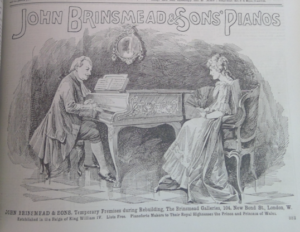Cover Image: Brinsmead Piano Advertisement, Daily Graphic, Sept. 2, 1893, 11. The Docket has returned from summer holidays with a double issue. The Docket 2.2-3 accompanies the Law and History Review’s recently-published symposium “Originalism and Legal History: Rethinking the Special Relationship.” As LHR Editor in Chief Gautham Rao writes, the relationship between historical scholarship and…
Issue: Volume 2, Issue 2-3 (September 2019)

Originalism’s Founding
Contemporary originalists, even as they experiment with linguistic philosophy, cannot stand apart from the antebellum history in which their approach was forged. The public authority of the Founding remains the sine qua non of originalism.
Lambertus DeRonde, Translation, and the Context of Public Meaning
To get at the original public meaning of the Constitution, it would be helpful if we could get into the mind of an everyday contemporary, a Joe the Ploughman, as it were.
George Washington’s Constitutional Theory
When you think of Alexander Hamilton, what do you think of? Maybe the musical or the fatal duel with Aaron Burr or the Federalist Papers? How about James Madison? Probably the Constitution, or perhaps his presidency. What about George Washington? You likely think of his command of the Continental Army, or his presidency captured by…
Originalism and the Common Law: The Case of Confrontation
Originalist jurists frequently turn to the common law of the Founding Era to illuminate the meaning of the Bill of Rights. This practice resonates with Founding Era protests against the initial body of the Constitution, many of which claimed that it failed to secure common law rights for Americans. But which common law? As Mary…
Method and Dialogue in History and Originalism
A worrying aspect of contemporary constitutional politics is that theories of constitutional interpretation are not just political, they are partisan. During the Warren Court, the New Deal, and at other times, the parties have disagreed about what the constitution means, often fiercely. But today one party is unified around an interpretive method that the other…
Going Back to School: Research Into Academic Politics and the Politics of Academics
My recent writings on constitutional originalism, which include my Law and History Review article “Originalism and the Academy in Exile,” stem from a broader research interest in law professors and the role that academics play in the ecology of the legal profession. Within my discipline—political science—law professors represent a largely untracked cast of legal actors….
History, Narrative and the European Legal Tradition: An Interview with Kaius Tuori
Kaius Tuori’s article “Narratives and Normativity: Totalitarianism and Narrative Change in the European Legal Tradition After World War II” appears in Law and History Review 37.2. He has agreed to answer a few questions about the findings of his article, his broader research on the Roman legal tradition, and the idea of “Europe” in legal…
“Fake News is an Old Problem”: An Interview with Anat Rosenberg
“In the article I examine the historical moment of the press’s move from one problematic structure of knowledge production to another: from dependence on political patronage, to dependence on market patronage.”
A “Peculiar Institution”: The Global and Southern Reach of the Second Bank of the United States, 1820-1840
Introduction During the course of President Andrew Jackson’s political conflict with the Second Bank of the United States—the famous “Bank War” that helped define Jackson’s presidency and contributed to the development of the Second Party System of Democrats and Whigs—many of Jackson’s allies argued that the Bank was ultimately harmful to the economic interests of…

